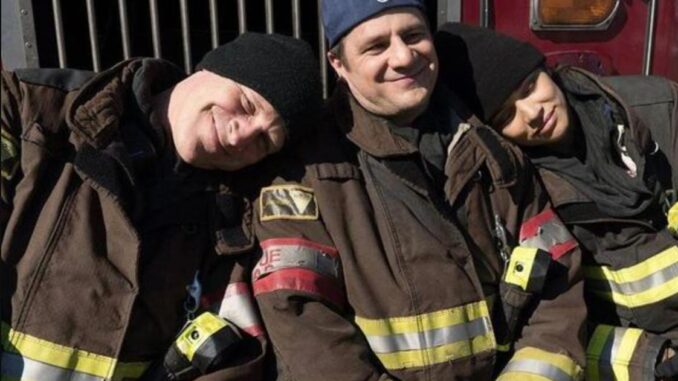
Why Chicago Fire Fans Feel the Series Is Turning Into a Soap Opera
Has ‘Chicago Fire’ Changed Its Tune?
“Chicago Fire” has been a fan-favorite since its premiere in 2012, but over the last few seasons, something feels different. Long-time viewers are starting to wonder if the beloved firefighter series is heading in a new, soap-opera direction, complete with heightened emotions, love triangles, and cliffhangers galore. But is this change real, or are viewers just nostalgic for the early days?
In this article, we’ll dive into the core reasons why fans think “Chicago Fire” is leaning into soap-opera territory, exploring everything from character dynamics to storyline shifts. Let’s find out if this change is a natural evolution or a turn fans didn’t see coming.

The Original Appeal of ‘Chicago Fire’
The series kicked off with a straightforward premise: showcasing the lives, challenges, and heroics of the firefighters at Firehouse 51. It wasn’t just another procedural; it gave viewers a sense of camaraderie, bravery, and raw, emotional storytelling that was grounded in real-world heroism. The early seasons won fans over with intense, action-packed rescues, exploring the personal and professional challenges of Chicago’s bravest.
What Has Changed Over the Seasons?
With more than a decade on air, “Chicago Fire” has evolved. While changes in tone and style are natural in long-running shows, fans have noticed a more dramatic pivot, especially regarding the focus on relationships and interpersonal conflicts over the rescue-centric plots.
Let’s dive into specific areas fans feel have shifted toward soap-opera territory.
1. Increasing Focus on Love Triangles and Relationships
Since its inception, “Chicago Fire” has featured romances among its characters, but recent seasons have amplified these storylines. Some fans feel that the series has leaned too heavily on love triangles, making romantic drama a central theme. The love lives of characters like Casey, Brett, and Severide are taking up more screen time, and some feel it detracts from the action-driven plots that originally drew them in.
2. Character Exits and Sudden Returns
Another sign fans point to is the frequent character departures and unexpected reappearances. Characters coming back after “long absences” feels straight out of a soap opera plot book. For instance, Casey’s temporary exit and Severide’s breaks have added to the sentiment that “Chicago Fire” is keeping fans on an emotional rollercoaster, typical of soap storytelling.
3. Dramatic Cliffhangers and Shocking Twists
Earlier seasons balanced action scenes with realistic outcomes, but recently, cliffhangers have become more exaggerated. Rescues ending in tragedy or tension-packed scenarios have given way to personal life cliffhangers, where relationship issues or character conflicts seem designed to keep fans guessing. This shift in focus has contributed to the soap-opera feel fans are noticing.
4. Over-the-Top Emotional Storylines
In soap operas, emotional reactions are typically heightened, with characters experiencing exaggerated highs and lows. While emotional storytelling has always been a part of “Chicago Fire,” recent seasons have taken it a step further, with episodes frequently showcasing tearful confrontations, dramatic monologues, and unresolved emotional conflicts that keep dragging on.
5. Shifting Focus from Firehouse to Personal Drama
Initially, “Chicago Fire” was a balance of personal lives and heroism on the job. Now, viewers feel like there’s been a major shift toward character drama at the expense of the life-threatening rescues that once took center stage. Episodes often leave viewers wondering if they’re watching a drama about firefighters or a show about the personal lives of the cast.
6. The Soap Opera Formula: Are Writers Following It?
“Chicago Fire” writers have faced the challenge of keeping the show fresh. In the pursuit of sustaining interest, many believe that the writers are borrowing from classic soap opera formulas: long-standing feuds, secretive relationships, and unexpected twists.
7. Emotional Manipulation: Making Viewers Invest Too Deeply?
Some fans feel that they’re being emotionally manipulated with dramatic storylines that lack resolution. Cliffhanger endings leave them hanging until the next season, creating more frustration than excitement. This emotional manipulation is a typical hallmark of soap operas, leading to another factor fans point out in their critique.
8. Loss of Focus on Realism
“Chicago Fire” initially captivated fans with its realistic portrayal of firefighter life, but more recent episodes have veered away from this authenticity. Overly dramatic scenarios that push the limits of believability are now more frequent. Fans who value realism over exaggerated drama find this shift disappointing.
9. Recurring Themes of Betrayal and Secrets
Recurring themes of betrayal and hidden secrets have become more common in recent seasons. Secretive relationships, conflicts among close friends, and hidden motives add tension but feel somewhat out of place in a show that was once more straightforward in its storytelling.
10. Fan Theories: Has Chicago Fire Changed for Ratings?
Some fans suggest the shift could be a strategic move to appeal to a broader audience. By adding more drama and complex interpersonal storylines, “Chicago Fire” may be aiming to pull in fans of traditional soap operas. But for those who loved the original grit and heroism, this change feels like a departure.
11. Character Development vs. Soap-Like Transformations
Characters who once had clearly defined arcs and natural growth now feel exaggerated or out of character. This shift makes it harder for fans to connect with their favorite characters, who seem to be altered to fit dramatic storylines rather than maintaining a realistic trajectory.
12. Fans’ Nostalgia for Early Seasons
Early seasons were action-oriented, and fans are vocal about missing the adrenaline-driven storylines and intense rescues. For many, the nostalgia for the early seasons feeds into the feeling that “Chicago Fire” has strayed from its original identity.
13. Social Media Reactions: A Window into Fan Sentiments
Social media is filled with fans discussing this soap-opera transformation. Online discussions reveal a mixed bag—some fans appreciate the added drama, while others voice their concerns over the changed tone, reinforcing the idea that “Chicago Fire” is losing its initial spark.
14. The Balance of Drama and Realism: What’s the Future?
“Chicago Fire” faces a choice—either maintain the current soap-opera style or reconnect with its roots in realistic, action-centered storytelling. Finding the balance between drama and realism could be the key to regaining some fans who feel alienated by recent changes.
15. Will ‘Chicago Fire’ Keep Its Core Fans?
The million-dollar question remains: can “Chicago Fire” evolve in a way that keeps its original fans happy while attracting new ones? It’s a delicate balancing act, and the coming seasons will likely reveal which direction the writers choose
While “Chicago Fire” continues to enjoy a strong following, fans’ concerns about its soap-opera direction highlight a significant shift in storytelling. Longtime viewers who were initially drawn to the high-stakes action and realistic portrayal of firefighter life feel this change alters the series’ essence. However, as with any long-running show, evolution is inevitable. Whether this change will stand the test of time—or send fans searching for a new favorite—only time will tell.
